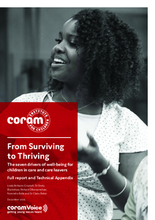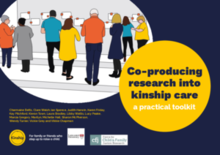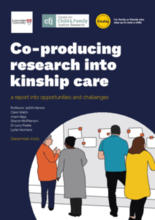Displaying 11 - 20 of 1185
This blog, from Hope and Homes for Children, argues that the new Netflix documentary Masaka Kids: A Rhythm Within—produced with the involvement of Harry and Meghan and set in a Ugandan orphanage—presents a superficially heartwarming story that risks reinforcing harmful perceptions about institutional care at a time when global leaders, including the UK, are advocating for family-based care and ending orphanages.
This article describes how thousands of adults who grew up in the UK care system continue to struggle to access their childhood care records — files that often hold the only written account of their early lives and decisions made about them.
This report from the Coram Institute for Children marks the 50th anniversary of Coram Voice and highlights the Bright Spots programme, which captures the perspectives of children and young people in care and care leavers to inform local and national policy. Drawing on 27,000 responses collected between 2015 and 2024, the study focuses on what matters most to children and young people in their lives, emphasizing their voices rather than care system outcomes or reasons for entering care.
Ten kinship carers and a research team from the charity Kinship and Lancaster University coproduced this toolkit in three fun and creative workshops.
This report examines opportunities and challenges in co-producing research on kinship care, highlighting the need to involve carers as equal partners rather than treating them solely as research subjects. Drawing on a study conducted between 2022 and 2025 and accompanied by a practical toolkit, it emphasizes inclusive approaches that leverage kinship carers’ lived experiences to produce research relevant to policy and practice across all types of kinship care.
The BBC investigation reveals that more than 1,000 adopted children in the UK have returned to care in the past five years, exposing a hidden crisis in which adoptive parents struggling to support traumatised children face blame, threats, and inad
This article reports how an investigation reveals that in 2024, over 2,000 children, including 864 trafficked children (37%) and 1,501 unaccompanied asylum-seeking children (13%), disappeared from care under UK local authorities, exposing alarming
This article reports that in 2024, over 2,000 children identified as trafficked or unaccompanied asylum seekers went missing while under the care of local authorities in the UK — 37% of 2,335 trafficked children, and 13% of 11,999 lone‑child asyl
This article notes how the UK government has announced a review of the National Protocol aimed at reducing the unnecessary criminalisation of children in care and care leavers, responding to evidence that they are disproportionately cautioned or c
This article reports that Alf Dubs, a veteran Labour peer and former child refugee, strongly criticized the new asylum proposals by the Home Office under Shabana Mahmood, accusing the government of “using children as a weapon.” The proposed reform



